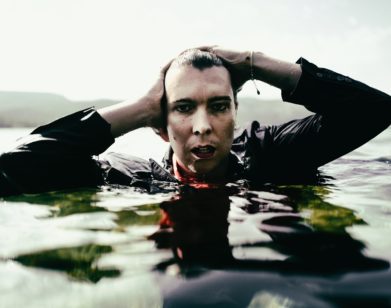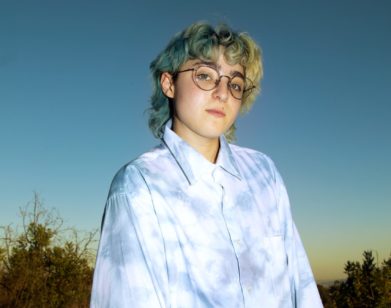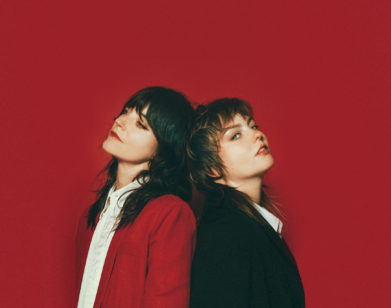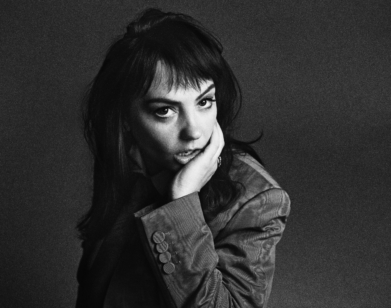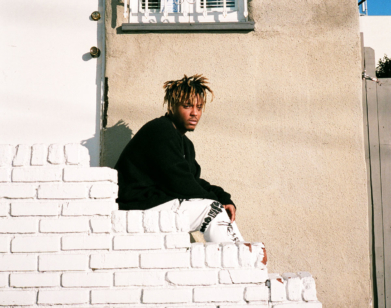ha ha ha
Faye Webster’s Divine Comedy
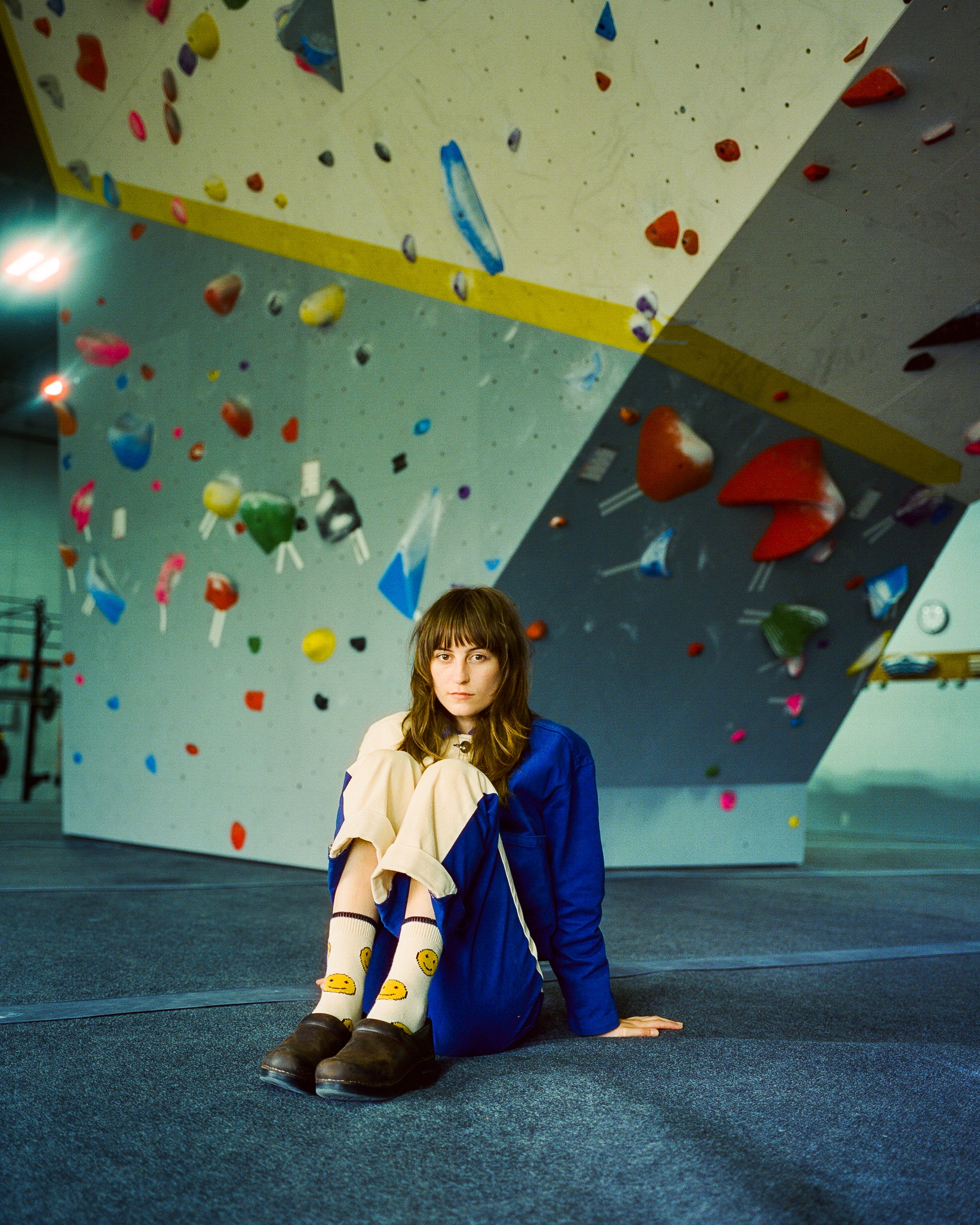
Photo by Pooneh Ghana.
Faye Webster knows she’s funny—and if you know Faye Webster, you probably know that already. That’s because she declares it proudly in the title of her new album, I Know I’m Funny haha, whose ebullient profundity delivers on its name. After achieving indie songstress cult status with 2019’s Atlanta Millionaires Club, her third record and Secretly Canadian debut, Webster ditched her signature visor and returned to her guitar. Webster began 2020 with the goal of recording an ambitious album, unaware that the desperate times ahead—and the desperate measures it necessitated, including bedroom recording sessions and GarageBand production—would deliver one that exceeds expectations. It’s at once sweeping and specific, grounded in slice of life storytelling, not unlike the stuff of comic greats. With her distinctly delicate croon—frayed at the edges with a folkish rasp—Webster sings and writes of the whimsical nothings of contemporary life. The video for “Cheers,” which features the real-life heavyweights of Atlanta’s dirt bike scene, shows Webster wondering aloud if she’ll get married before her brothers do; “A Dream with a Baseball Player” is a playful ode to her youthful crush on the Atlanta Braves outfielder Ronald Acuña Jr. While some of Webster’s strongest work hinges on the well-trodden topic of unrequited love, I Know I’m Funny haha positions Webster at the altar of Pitchfork reader worship, if she wasn’t there already. And that’s nothing to laugh about.
———
SARAH NECHAMKIN: I wanted to talk about the title, and how it sets the tone for the whole album. What’s your relationship to comedy?
FAYE WEBSTER: I think the title just came about. It kind of escalated into being the album title. When I was thinking of album names, I was kind of playing around with lyrics a lot. I was brainstorming with my brother, who I work with a lot, just doing graphic design and stuff. And I was having trouble. It was kind of annoying because my last album was so easy and just a no-brainer for me. And then my brother was like, “Why aren’t you calling it I Know I’m Funny ha ha? That’s the best lyric and song that you have on the album.” And I was like, “I don’t know. Should I? What if people think I’m full of myself or whatever?” But he convinced me to just name it that. I liked it because it doesn’t sound like a album title.
NECHAMKIN: It sounds like it could be the name of a Netflix stand-up comedy special or something.
WEBSTER: Exactly.
NECHAMKIN: Have you seen that movie Funny Ha Ha? It’s like one of those Mumblecore movies.
WEBSTER: I haven’t! Good to know.
NECHAMKIN: You have so many good one-liners like that. I had a creative writing teacher once who referred to what he called “misfit details”—those weird little details of daily life that people don’t really think about, and yet when you identify them, they become profound. Your work is full of that—the dinner party you refer to in “I Know I’m Funny,” for example. How do you decide in your songwriting process what goes in and what goes out?
WEBSTER: In post. I very rarely live a day in my life where I’m like, “Oh, I’m writing about this.” I’m not thinking about it at the time. I think that’s why my songs are so full of, like you were saying, just random one-liners. To me, in songwriting, the more you think about it, the worse it is. I don’t like to go back and fix lines or alter them. I just like to have it how it was. And I feel like that’s kind of what makes it achieve what you were talking about—the little things that nobody is writing about.
NECHAMKIN: How did your partner and his sister react to you incorporating that dinner with them into the song?
WEBSTER: I honestly never asked. We’re all close, so it’s cool.
NECHAMKIN: There’s always a little bit of, do you want to tell people when you’re writing about them, or just kind of let it happen?
WEBSTER: For sure. I’ve literally written a line about my mom before and then gone to my brother and been like, “Should I take this out? Do you think mom would be sad if she heard this?” But I think that was the turning point to me, where I was like, you can’t do that.
NECHAMKIN: We did a recent interview with St. Vincent, and she was talking about that, how the album [Daddy’s Home] is sort of about her dad getting out of prison. And she was just like, “Yeah, my dad didn’t really care. I showed it to him and he was just like, cool.”
WEBSTER: That’s cool.
NECHAMKIN: You’re living with your partner now.
WEBSTER: Yes.
NECHAMKIN: How has that informed your writing? Do you think it’s easier to write when you’re in love?
WEBSTER: I wouldn’t say it’s easier or harder. But I do think there’s a dramatic difference in this album versus my last one. But also, it’s heavily influenced by the pandemic, just because I have been home so much and I have been with this person so much.
NECHAMKIN: It’s a very weird vacuum experience. I feel like people either thrive in it or they don’t, in terms of creativity and output.
WEBSTER: Yeah. I’m one of the people who have been struggling. It’s cool to see people who are thriving.
NECHAMKIN: I mean, you put out an album. It could be worse.
WEBSTER: For sure. I think it’s the pressure of everybody expecting you to be so creative right now. That takes the fun out of it for me.
NECHAMKIN: I’m thinking about your last album, and “Kingston,” how it really pins that feeling of loneliness down. I was listening to it a lot during the pandemic. But you seem to be accessing lighter feelings now, or more partnered, in-company feelings? How do you find that manifesting in your music?
WEBSTER: I kind of touch on that [loneliness] in this new album, just because half of it are older songs that were more AMC [Atlanta Millionaire’s Club]-era that didn’t really fit well on AMC and just needed to be on this one. This was just a better home for it. But the latter half is very relationship-oriented, and I think you can definitely tell which ones are which. I like it. I think it’s a good explanation of the past two years of me, since people have been able to hear music from me.
NECHAMKIN: A divine comedy. Do you ever play back the album, reflect on it, or do you just shelve it once it’s released?
WEBSTER: I feel like touring is listening to it, in a sense. I’m not putting it on my record player, but at the same time I’m playing these songs all the time and I’m hearing them as I play them. And I kind of like it more because you can pick which songs you like. I still play a few older songs that I really like and have aged well with me, but there’s also these songs that I don’t relate to anymore, and after a while I’m not playing them. Every artist has that feeling. So it’s kind of nice that at a show I’m playing everything I like to play. It’ll be a lot of shows when I do not play “Kingston.”
NECHAMKIN: Really? Are you sick of it?
WEBSTER: I’m not sick of it, but sometimes people will come to my shows and just stand in the front row and check their watch constantly, just watching for “Kingston.” And it’s like, I have other songs, dot dot dot! But I do feel that, because you go to an Angel Olsen concert and you want to hear “Shut Up Kiss Me.” So, I understand. I feel you.
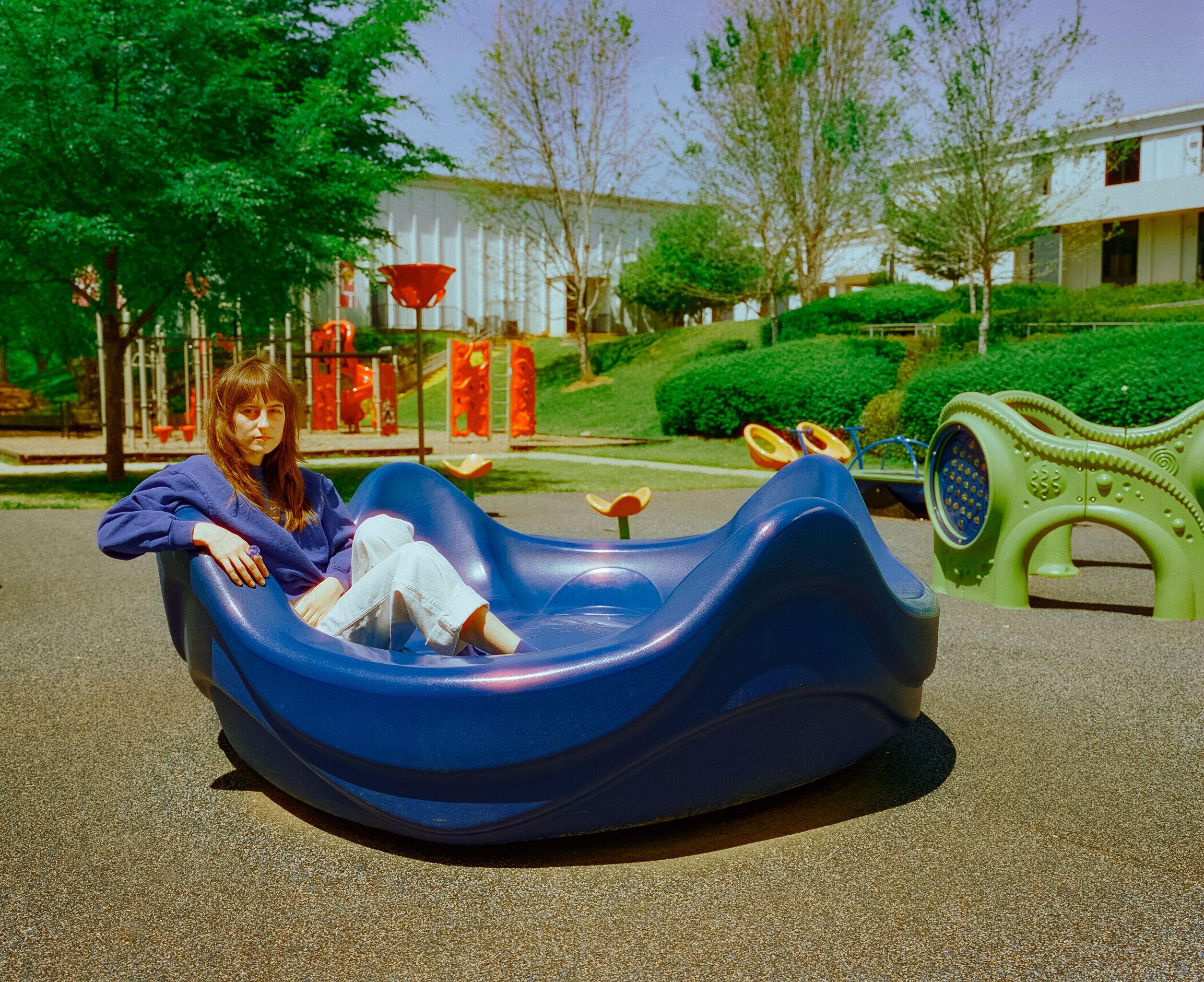
Photo by Pooneh Ghana.
NECHAMKIN: Your song “A Dream about a Baseball Player” is about your crush on a real live baseball player [the Atlanta Braves outfielder Ronald Acuña Jr.]. What’s the backstory behind that?
WEBSTER: There was a year where I wasn’t really touring much. I was home a bunch, living alone, really bored. So, I went through a really big [Atlanta] Braves phase, where I was watching the games every day, going to the games twice a month, just really keeping up to date. I think I just got brainwashed. Just because I had nothing else to do. I had already put out a record and already toured. Every time I go through a phase with something, I don’t stop until it’s mastered or completed. At one point, somebody from the Braves reached out to me after reading a Pitchfork interview where I was talking about the Braves, and he just invited me to sing and meet the players. And when I did that, I was just like, “Alright, I think that was it. I think that’s what I needed to complete this chapter.”
NECHAMKIN: What was it like performing in a stadium?
WEBSTER: It was kind of crazy. I was just singing, “Take Me Out to the Ballgame” because I don’t think I could ever sing the National Anthem. I’d be too nervous. But even then, five minutes before, I was Googling the lyrics. I was like, “Bro, you know the lyrics. You don’t need to Google lyrics to ‘Take Me Out to the Ballgame.'” But at the moment when you’re in a stadium full of thousands of people, and you’re the only one with the microphone, it’s like, “Yes, I do need to Google this.”
NECHAMKIN: Has [Acuña] always been your ultimate crush, or did you have several?
WEBSTER: Dang. That’s a good question. Definitely top-tier.
NECHAMKIN: I think that question says a lot about who you are. Mine was Chris Martin from Coldplay.
WEBSTER: OMG. That’s funny.
NECHAMKIN: Did you have any music crushes, or obsessions, when you were young?
WEBSTER: My earliest memory of being obsessed was with Avril Lavigne, and I made a fake music video in my driveway to “Complicated.” I know.
NECHAMKIN: That’s incredible. She was my first concert. Gavin DeGraw opened.
WEBSTER: Really? OMG. That sounds so sick. Mine was Alison Krauss. All I remember was the feeling of like, “Oh my gosh, this is my first time seeing somebody that I’d grown up looking at pictures of and videos of.” The last time I felt that way I went to a Duke basketball game and I sat kind of close to the court. My dad went to Duke, so I was also brainwashed into Duke basketball. But I think it’s because it’s a different profession. I don’t ever see athletes. I see musicians all the time and I do that, so I know what it’s like. I don’t really care anymore.
NECHAMKIN: Have you ever had the reverse, where someone is obsessed with you?
WEBSTER: One time I posted my P.O. Box and asked people to send me scratch-offs from their state, which I think is illegal, but I didn’t know. People were sending me scratch-offs and yo-yo’s in my PO Box. And this one person sent me a letter that was about how I saved her life multiple times. And she was in Chicago or something, and I was playing in Chicago later that year. And I just messaged her and was like, “Can I put you on the list? I would be down to meet you.”
NECHAMKIN: Did you end up meeting her?
WEBSTER: Yeah. It was overwhelming, but it’s funny to think about, because I’m such a normal person in my eyes. But I’m sure there’s people like that for me.
NECHAMKIN: I want to talk about the “Cheers” video. I’m super curious of how you got into this Atlanta dirt bike scene, because it doesn’t seem to go with the theme of the album, but then it also does.
WEBSTER: There’s somebody in Atlanta, his name is Matt Swinsky, that I work with a lot, and he’s just a really big motion pictures dude. And I’ve done music videos with him before, photo shoots, etc. So when this song was coming out, I showed it to him, and it’s kind of the outlier on the album, obviously. But it’s still Faye Webster. But just off first listen, he was like, “I absolutely know exactly what to do with this music video.” He’s always been really close with Bikelife in Atlanta. There’s this one guy named Sig, who runs all the Bike Life stuff. And he was like, “This would literally be perfect. They would be so down to this stuff. But at the same time it’s still going to be you and it’s still not going to be crazy.”
NECHAMKIN: It feels weirdly calm.
WEBSTER: Yeah. It was definitely an Atlanta thing. Everybody knew each other. A lot of people look at the Bikelife in Atlanta and shame it just because, I don’t know, they’re disruptive to the city, but no, they’re not. They’re just these fake-ass kids who love biking. It was nice to show that they’re sick and cool.
NECHAMKIN: And the yo-yoing.
WEBSTER: That was literally my favorite part.
NECHAMKIN: Do you feel a certain responsibility toward Atlanta?
WEBSTER: I do feel like it’s a part of me, Faye Webster, in general. I incorporate it as much as I can just because I feel like I owe it so much.
NECHAMKIN: There’s this kind of melancholic country influence in your music. Do you find that you connect with country, being from the South?
WEBSTER: For sure. My mom and her whole family are from Texas, so I grew up listening to country music, but classics, not the new country. I was especially influenced by Western swing music. It’s stuck with me. It’s evolved, but it’s still there and you can tell.
NECHAMKIN: I listened to this podcast once, it was a Malcolm Gladwell thing, and he was asking why country music makes you cry and rock ‘n’ roll doesn’t. That’s obviously not always true, but he was saying that there’s something intrinsic to country that’s melancholic, and he ended up saying that a lot of it was the specifics.
WEBSTER: I’ve really never thought about that. For years in country music, people were only writing about their feelings. I feel like in rock ‘n’ roll, it’s feel-good music. With country, it’s just an off rip of listening. I definitely am a sucker for the cheesy old “Why she leave me?” country music. I really love Glen Campbell. One of my favorite bands is Asleep at the Wheel, and they just do the classics.
NECHAMKIN: If you could have dinner with four other musicians that are alive, who would you pick?
WEBSTER: I would pick Patti Smith first. Because I admire her as an artist in general, outside of music as well, but also with her post-famous day to day life. She still acts like she has $0 and just sits at random places and reads, like she’s not Patti Smith or something.
NECHAMKIN: I saw her on Broadway last year, just walking around with these long gray braids, her hair all messy.
WEBSTER: That’s insane. To the present day, she has not changed. Who else would I choose? This is hard.
NECHAMKIN: You can also extend it to people in general, not just musicians. I don’t know if that makes it easier or harder.
WEBSTER: Harder. I know: somebody who won’t get in the way of my one-on-one with Patti.
NECHAMKIN: Good choice. I want to talk a little bit about your style. I’ll just go on record and say, I think you have the best bangs in music.
WEBSTER: Nooo! Bangs are so high-maintenance. Especially on tour, I’m like, “Dang, you got to just hope you wake up with some good bangs in the morning.” Also, once you get them you cannot get away. It’s going to just be a really awkward length as you’re trying to grow it out. I think I got them in high school. I was like, “Well, this is it. I have to do this.”
NECHAMKIN: My hairstylist once said, “When you want them to grow out, it takes forever, but when you don’t, when you like them where they are, then they grow super fast.”
WEBSTER: Exactly.
NECHAMKIN: You used to wear these hat-visor pieces all the time, and I feel like it’s become kind of a uniform for you, or at least a signature. Where did that come from?
WEBSTER: I just started wearing it all the time, every day for two years. And then it just became a part of me, or just a recognizable piece. It was a headband visor. I mainly liked it because it just called for such an easy hair day.
NECHAMKIN: For the bangs.
WEBSTER: I’m just going to put on this headband and I’m off, I’m out of the house. I don’t have to do anything. I don’t do any work. That’s probably why it lasted so long. I ditched it in 2019. I was like, “Alright, it’s time to move on.”

